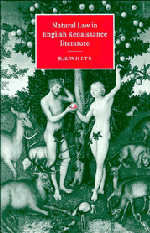Book contents
- Frontmatter
- Contents
- Preface
- Acknowledgments
- 1 Natural Law in history and Renaissance literature
- 2 The heritage of classical Natural Law
- 3 The reception of Natural Law in Renaissance England
- 4 Law and literature in sixteenth-century England
- 5 More's Utopia
- 6 ‘Love is the fulfilling of the law’: Arcadia and Love's Labour's Lost
- 7 ‘Hot temper leaps o'er a cold decree’: The Merchant of Venice and Measure for Measure
- 8 Shakespeare's The History of King Lear
- 9 Milton and Natural Law
- Epilogue: Hobbes and the Demise of classical Natural Law
- Appendix: Aquinas on the right to own private property
- Notes
- Select bibliography
- Index
6 - ‘Love is the fulfilling of the law’: Arcadia and Love's Labour's Lost
Published online by Cambridge University Press: 17 September 2009
- Frontmatter
- Contents
- Preface
- Acknowledgments
- 1 Natural Law in history and Renaissance literature
- 2 The heritage of classical Natural Law
- 3 The reception of Natural Law in Renaissance England
- 4 Law and literature in sixteenth-century England
- 5 More's Utopia
- 6 ‘Love is the fulfilling of the law’: Arcadia and Love's Labour's Lost
- 7 ‘Hot temper leaps o'er a cold decree’: The Merchant of Venice and Measure for Measure
- 8 Shakespeare's The History of King Lear
- 9 Milton and Natural Law
- Epilogue: Hobbes and the Demise of classical Natural Law
- Appendix: Aquinas on the right to own private property
- Notes
- Select bibliography
- Index
Summary
The order of the precepts of the natural law corresponds to the order of our natural inclinations. For there is in man a natural and initial inclination to good which he has in common with all substances; in so far as every substance seeks its own preservation according to its own nature. Corresponding to this inclination, the natural law contains all that makes for the preservation of human life, and all that is opposed to its dissolution. Secondly, there is to be found in man a further inclination to certain more specific ends, according to the nature which man shares with other animals. In virtue of this inclination there pertains to the natural law all those instincts ‘which nature has taught all animals’ [Ulpian], such as sexual relationship, the rearing of offspring, and the like.
(Aquinas, Summa Qu. 94. Art. 2)Aquinas’ apparently unproblematical words on the ‘naturalness’ of sexual relationship open up a thorny area for the Renaissance and conceal yawning gulfs and treacherous debates within Natural Law theory. Indeed, the difference of degree between Aquinas and Calvin over the issue of the inwardness or otherwise of Natural Law becomes a fundamental one, which was to exercise Milton in particular, when it is focused on sexuality, with its negative and positive concomitants, shame, companionship, and procreation.
- Type
- Chapter
- Information
- Natural Law in English Renaissance Literature , pp. 134 - 158Publisher: Cambridge University PressPrint publication year: 1996

